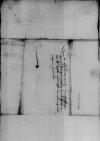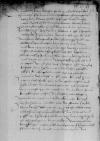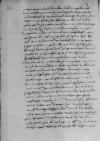Wir haben gestrigs tages in beywesen des edlen, wollgeborenn herren ⌊Achaci(us) Zceme⌋, dantzker castellan unnd hauptmann zum ⌊Stume⌋ etc. bey dyssem bottenn E(wer) Er(barkei)t ⌊⌋ neben der instruction[1], / domit E(wer) Er(barkei)t ahn ⌊ko(niglich)e m(ajeste)t⌋, unnsernn allergnedigsten herren, geschickt, / erhaltenn, / unnd neben dem herren castellan, / mit dem wir auch zuvor, ehe dan ehr zw ⌊furstlicher durchlauchtigkeit⌋ sich het begebenn, / gleichmessig in der selbten hanndlung / dazw mal unns beredtenn weytlofftig bedocht und bewogen, / unnd hat uns solche E(wer) Er(barkei)t vorsichticheyt inn dyssenn wunderlichen gelofften uff zwkunfftige zeit nicht wenig gefallenn. Zuvoraus, das solchs E(wer) Er(barkei)t ahn ⌊ko(niglich)e m(ajeste)t⌋ durch eigene bottschafft hat lossen gelanngen, / und dyser sachen die bane zw gericht. / Dieweill dann nicht zymen wyll an der andern ⌊herre(n) konigklichen rethen⌋ in solchem wichtigem vornem(m)en / roth und bedencken / ahn ⌊ko(niglich)e m(ajeste)t⌋ zwschreybenn, haben wir den herren ⌊castellann⌋ darzu vermocht, / das ehr alles, was aus ahnsuchen ⌊furstlicher d(urchlauch)t⌋ durch uns und E(wer) E(rbarkei)t in dyssen zwfellenn vor das nutzlichste ist ahngesehenn denn andern vornemesten konigklichen rethen soll ansagen und zw gemutte gefuren / unnd unns mit denn ersten ire  APG 300, 53, 267, p. 64 meynung unnd gutduncken lossen wyssen. / Als dann wolle wir ane seumen / disss alles, wie es eindrechtiglich vorfast und bedocht, / durch unsern botten / mit fleis schrifftlich an ⌊ko(niglich)e m(ajeste)t⌋ lossen gelangen, / do neben auch denn am hove schreyben, die disse sachen mit denn ersten mugen vorstellenn, / unnd domit eyne bottschafft / ahne beschwer ko(nigliche)r m(ajeste)t mit gutter fuege an ⌊kay(serlich)e ro(misch)e m(ajeste)t⌋ inn ⌊Hispanien⌋ unverzŏglich muge gefertiget werdenn, / gedencke wir das beste zw sein ko(niglich)e m(ajeste)t dareinzwfuren, / das wir bitten ire m(ajeste)t wolde die aussrichtung und unkost zw solcher bottschafft vonn dem gelde, das negst dissenn lannden zwr notturfft yst eingelegt, / nemen, / unnd domit solchem botten statlich in kleiner anzall, / domit er solchen lanngen weg mit muglicher eil unbeschwert muge vorbringen, gnedigklich abfertigenn. / Und domit alles fueglicher weyse gescheen, / wolle wir auch unverdrossen ein instruction zw solcher legacion zu entwerffen uns understenn, / domit die canntzleye ahm hove wylliger werde etc. /
APG 300, 53, 267, p. 64 meynung unnd gutduncken lossen wyssen. / Als dann wolle wir ane seumen / disss alles, wie es eindrechtiglich vorfast und bedocht, / durch unsern botten / mit fleis schrifftlich an ⌊ko(niglich)e m(ajeste)t⌋ lossen gelangen, / do neben auch denn am hove schreyben, die disse sachen mit denn ersten mugen vorstellenn, / unnd domit eyne bottschafft / ahne beschwer ko(nigliche)r m(ajeste)t mit gutter fuege an ⌊kay(serlich)e ro(misch)e m(ajeste)t⌋ inn ⌊Hispanien⌋ unverzŏglich muge gefertiget werdenn, / gedencke wir das beste zw sein ko(niglich)e m(ajeste)t dareinzwfuren, / das wir bitten ire m(ajeste)t wolde die aussrichtung und unkost zw solcher bottschafft vonn dem gelde, das negst dissenn lannden zwr notturfft yst eingelegt, / nemen, / unnd domit solchem botten statlich in kleiner anzall, / domit er solchen lanngen weg mit muglicher eil unbeschwert muge vorbringen, gnedigklich abfertigenn. / Und domit alles fueglicher weyse gescheen, / wolle wir auch unverdrossen ein instruction zw solcher legacion zu entwerffen uns understenn, / domit die canntzleye ahm hove wylliger werde etc. /
Wie auch E(wer) E(rbarkei)t von unns bitten von wegen des unlustigenn unnd smehenden(n) feindes / unnd der, / die den auss unnserm mittell villeicht ahngehetzt, / zwschreyben, / wolle wir uns in unserm schreyben zw ⌊ko(niglich)e m(ajeste)t⌋ ahn E(wer) Er(barkei)t instruction durch negste bottschafft geschickt czihenn und  APG 300, 53, 267, p. 65 referiren, / bittende ire m(ajeste)t die selbte / in dem fhal / zwbehertzigenn, / unnd die der gestalt zufurdern auch nicht underlosssen / unnsern gutten, vertrawten freunden am hoff derhalben E(wer) E(rbarkei)t zw gute weitloffiger zu schreyben. / Worynne wir auch sonst E(wer) E(rbarkei)t vil furderung, nutz und guts wyssen zu schaffen unnd thun, zw der wir uns dergleichenn gern wolten vorsehen, / soll ahn unnserm fleys unnd alter zwnegung zw E(wer) E(rbarkei)t unnd unnserm vatterland nichts abegen. / Gote inn seyne gnade bevolen.
APG 300, 53, 267, p. 65 referiren, / bittende ire m(ajeste)t die selbte / in dem fhal / zwbehertzigenn, / unnd die der gestalt zufurdern auch nicht underlosssen / unnsern gutten, vertrawten freunden am hoff derhalben E(wer) E(rbarkei)t zw gute weitloffiger zu schreyben. / Worynne wir auch sonst E(wer) E(rbarkei)t vil furderung, nutz und guts wyssen zu schaffen unnd thun, zw der wir uns dergleichenn gern wolten vorsehen, / soll ahn unnserm fleys unnd alter zwnegung zw E(wer) E(rbarkei)t unnd unnserm vatterland nichts abegen. / Gote inn seyne gnade bevolen.
 APG 300, 53, 267, p. 64 meynung unnd gutduncken lossen wyssen. / Als dann wolle wir ane seumen / disss alles, wie es eindrechtiglich vorfast und bedocht, / durch unsern botten / mit fleis schrifftlich an
APG 300, 53, 267, p. 64 meynung unnd gutduncken lossen wyssen. / Als dann wolle wir ane seumen / disss alles, wie es eindrechtiglich vorfast und bedocht, / durch unsern botten / mit fleis schrifftlich an  APG 300, 53, 267, p. 65 referiren, / bittende ire m(ajeste)t die selbte / in dem fhal / zwbehertzigenn, / unnd die der gestalt zufurdern auch nicht underlosssen / unnsern gutten, vertrawten freunden am hoff derhalben E(wer) E(rbarkei)t zw gute weitloffiger zu schreyben. / Worynne wir auch sonst E(wer) E(rbarkei)t vil furderung, nutz und guts wyssen zu schaffen unnd thun, zw der wir uns dergleichenn gern wolten vorsehen, / soll ahn unnserm fleys unnd alter zwnegung zw E(wer) E(rbarkei)t unnd unnserm vatterland nichts abegen. / Gote inn seyne gnade bevolen.
APG 300, 53, 267, p. 65 referiren, / bittende ire m(ajeste)t die selbte / in dem fhal / zwbehertzigenn, / unnd die der gestalt zufurdern auch nicht underlosssen / unnsern gutten, vertrawten freunden am hoff derhalben E(wer) E(rbarkei)t zw gute weitloffiger zu schreyben. / Worynne wir auch sonst E(wer) E(rbarkei)t vil furderung, nutz und guts wyssen zu schaffen unnd thun, zw der wir uns dergleichenn gern wolten vorsehen, / soll ahn unnserm fleys unnd alter zwnegung zw E(wer) E(rbarkei)t unnd unnserm vatterland nichts abegen. / Gote inn seyne gnade bevolen.



